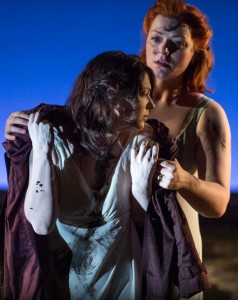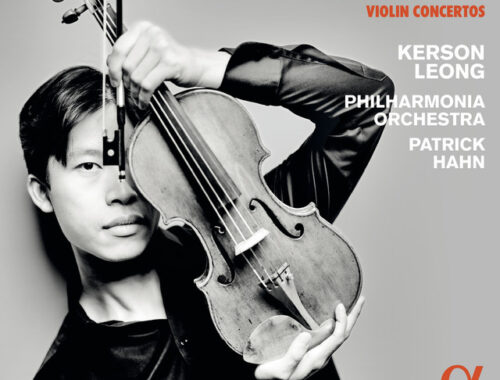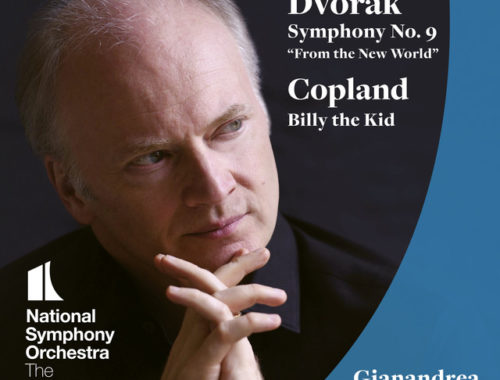The Rape of Lucretia, Glyndebourne Touring Opera (Review)
 Lucretia is quite literally pulled from the earth like a living artefact – and to the earth she will return. But when we arrive at the contentious final moments of Britten’s opera The Rape of Lucretia and the Female Chorus – seeking answers for this chaste woman’s violation and death – asks “Is it all?”, the question I was asking was how director Fiona Shaw would reconcile herself to the somewhat pat assertion of librettist Ronald Duncan that only God has the answers. “It is not all”, opines the Male Chorus, but all he can offer is a sermon culminating in the words “He is all.” Suffice it to say that Shaw, in a masterly final coup, does not let that pass unanswered.
Lucretia is quite literally pulled from the earth like a living artefact – and to the earth she will return. But when we arrive at the contentious final moments of Britten’s opera The Rape of Lucretia and the Female Chorus – seeking answers for this chaste woman’s violation and death – asks “Is it all?”, the question I was asking was how director Fiona Shaw would reconcile herself to the somewhat pat assertion of librettist Ronald Duncan that only God has the answers. “It is not all”, opines the Male Chorus, but all he can offer is a sermon culminating in the words “He is all.” Suffice it to say that Shaw, in a masterly final coup, does not let that pass unanswered.
This thrilling production for Glyndebourne Touring Opera – the company’s first since it gave the work’s premiere in 1946 – is remarkable in so many ways not least in making everyone complicit in the telling of this tale – including us, especially us, the audience. The Male and Female Chorus (the marvellous Allan Clayton and Kate Valentine) make their role superficially clear to us from the outset – they are storytellers, intermediaries between their audience and the events unfolding. But what they don’t tell us and what Shaw emphatically underlines is their emotional and physical empathy with those events. When Male Chorus repeatedly coos Lucretia’s name to the the arrogant Tarquinius (Duncan Rock – well named for his physical and vocal prowess) he blatantly massages the Etruscan’s lust (“Loveliness like this is never chaste”) and in the exhilarating “ride to Rome” sequence leaps on to the shoulders of his charge and vice versa – there is a physical and very “male” connect. More unsettling, though, is the sexual congress of Male and Female Chorus in the wake of the rape, almost suggesting a replication of it.
Shaw and her designers Michael Levine (set) and Nicky Gillibrand (costumes) are digging out history here and the concept of an archeological dig – a raked field of mud – is a brilliant one. Props come out of the earth and straight into the hands of the characters who may or may not have once used them. Male and Female Chorus are then pointedly contemporary from the time of the opera’s conception – post war – and we, of course, are in the here and now. And because Gillibrand’s costumes for the male generals – muddy, dusty, primitive, as if they, too, have just been dug up – allude also to the present, Shaw is able to open up the psychological debate of rape as a weapon of war.
“How cruel men are to teach us love”, lament Lucretia’s women (Ellie Laugharne’s Lucia with her keening melismas and Catherine Wyn-Rogers motherly Bianca) knowing full well that their honour is a male lottery. “Virtue in woman is a lack of opportunity.” Line after line betokens an endemic misogyny. And so the impact of that heartbreaking scene between Lucretia (Claudia Huckle) and her loving husband Collatinus (the excellent David Soar) is redoubled as Britten underscores Lucretia’s final entrance with a Bachian purity, cor anglais duly dispensing nobility, remorse and compassion. Huckle plays the inconsolability of the scene very touchingly and Soar’s tenderness is overwhelming amidst so much male thuggery. Hope fleetingly prevails.
Yet again one wonders at Britten’s intuitive nose for theatre, his tiny orchestra – vibrantly directed by Nicholas Collon – alive with sounds connected at all times with the nerve-endings of the drama: the tinkling of the harp, archaic and timeless, like an itch in our imagination, the queasy glissandi of pedal timpani.
Fiona Shaw is mindful of every nuance, she and her cast inhabit every nuance and dig deep in every sense. It is a remarkable piece of work.
You May Also Like

GRAMOPHONE Review: Britten & Bruch Violin Concertos – Kerson Leong, Philharmonia Orchestra/Hahn
07/08/2023
GRAMOPHONE Review: Copland Billy The Kid Suite / Dvořák Symphony No. 9 ‘From the New World – National Symphony Orchestra, Washington DC/Noseda
25/03/2020